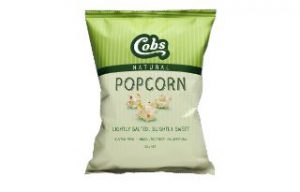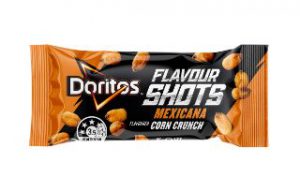
It seems that in Australia, we’re all addicted to snacks. Especially the savoury kind. And as eating trends evolve from an emphasis on a large breakfast, lunch and dinner to lighter meals supplemented by frequent snacking, the demand for on-the-go salty snacks is only increasing.
Recently published data from market research company Roy Morgan found nine in 10 Australians consume packaged snacks in an average week.
Of these, savoury snacks – mainly potato chips, were the most popular category with 66% of us consuming them weekly.
Our appetite for snacks in general appears insatiable. According to the State of Snacking report released by Mondelez last year, Australian consumers eat as many snacks as they do meals per day.
This is especially true for Millennials and younger generations, who are embracing the smaller portions, eaten more frequently trend with gusto.
And reflecting how in-tune C-stores are to the evolving snack size – not quite a meal but more substantial than a stop-gap between meals, American convenience chain QuikTrip have coined their own term on the eating habit: “Snackle”, described as being part snack, part meal.
Interestingly, Roy Morgan found there was a generational divide when it came to snack preferences. While millennials look to snacks that boost their mood and/or brainpower and are more likely to opt for gluten free options, Baby Boomers seek out snacks low in sugar, fat and calories.
Which fits with further Roy Morgan findings showing the second leading snacks category was healthy snacks, encompassing rice crackers, muesli bars and breakfast bars.
The category with the lowest consumption was sweet biscuits, indicating Australian consumers are moving away from sugar-laden foods.
One brand covering all of these snacks bases is Cobs Fine Foods, whose range of popcorn and assorted snacks fall within the growing better-for-you category, delivering on consumer tastes for low sugar, low calorie and gluten free options, while satisfying our need for salt and flavour.
Cobs were the first to release a range of ‘lightly salted slightly sweet’ flavoured popcorn, which remains their best seller, that hits on the elusive balance between healthy and tasty.
Their products also contain few ingredients, all of them natural and despite fitting the health niche, they have maintained a broad appeal. Brand manager Samantha Moriarty said their products are as popular with families, singles and couples as they are with health-conscious consumers.
“Snacking is on the rise in Australia, as consumers lead busier lives, often resulting in a transition from the traditional three meals a day and one big shop per week mantra. Portable snacks that deliver convenience, taste and are better for you, are now all the rage, leading to an explosion of new offers beyond traditional salty snacks like potato chips to healthier options.”
“This trend has not only been seen in major supermarkets but also convenience stores, as consumers look to this channel as a quick and easy way to ‘top up’ when they’re on the go. Convenience stores are an important channel for Cobs, as we want to ensure our delicious snacks are available to our consumers when they need us most.”

Cobs have also worked hard at innovation in NPDs. Including their Pop’d Chips range, made from a potato, rice and corn blend that’s air popped to replicate the crunch of potato chips, without the frying.
“This means they have at least 60% less fat than regular potato chips, making them a healthier option for consumers. Consumers love the taste and benefits of this range, proven by Pop’d Chips winning ‘Product of the Year’ in the Healthy Snacks Savoury category for 2020. There are now four delicious flavours to choose from as we’ve just launched Salt and Vinegar in Woolworths and select Independents.”
Another recent release is their Corn Puffs in Cheesy Cheddar, Sour Cream and Chives and Barbecue. And their Ancient Grain Corn Chips, made from corn, chia seeds, sorghum and quinoa in Cheesy Cheddar, Sea Salt and Barbeque.
A survey from Canstar Blue last year found the top five brands for Australian consumers were Smith’s, Red Rock Deli, Kettle, Doritos and Pringles. Other mentions included Thins, Twisties, Grain Waves and Cheezels.
Of the 3,100 people surveyed, just 13% said they didn’t eat chips. However, for 32% of people, it was their main snack choice.
Of the flavours favoured, original, salt and vinegar and cheese were the top flavours. Interestingly, Canstar found those aged 70 and older preferred original, while salt and vinegar were the pick among 18-29-year-olds.
A PepsiCo spokesperson, whose brands include Smiths, Twisties, Doritos, Red Rock Deli, Sakata and Grain Waves said snack foods continue to be an essential part of the convenience channel. Adding last year saw a strong growth of 6.3% MAT and the category significantly outperformed other impulse categories, including beverages, by 0.9%.
And while nuts, jerky and healthy snacks were all experiencing growth, “chips remain at the heartland of the category”, they said, accounting for 81% of sales and the company continue to invest in NPDs
“2020 has already seen some exciting additions to PepsiCo’s portfolio including new flavour innovations and new ranges. Smith’s launched Poppables, a new format of light and crispy, potato snacks for the brand. In February we launched Mash Ups, combining some of our consumers’ favourite snacks Doritos, Twisties and Cheetos, into the one pack,” they said.
“Our latest innovation, Doritos Flavour Shots comes in a ready-to-go format, so you can get your iconic Doritos flavour boost fast and keep going with your day, making it an ideal product for the convenience channel.”
“Innovation plays a core role in snacking category growth; in 2019, it accounted for 10.9% of sales, which is 1.4% more than in 2018. Innovation plays a supporting role to the core range as new products help drive conversion to purchase and increases basket spend with shoppers more likely to buy both core and new products.”

Research by Nielsen found that just 10 per cent of consumers considered themselves loyal to brands and spend an average of 15 seconds looking for items on a shelf. Meaning when it comes to snacks, while we may be decisive, we’re choosing products based on more than flavour or product satisfaction.
And CEO of United Convenience Buyers Darren Park said it was important for retailers to make it easy for consumers to access on the go snacks, setting competitive prices, using promotional mechanics and ensuring product availability.
“Having a variety of snack categories represented for every daypart, ensures your outlet can be a snacking destination through the day. Apart from the primary display area, many snacking purchases are made from secondary locations in the store. Finally, POS and seasonally relevant display theatre (E.g. movie or sport related) can help harness the shopper’s interest,” Mr Park said.
And added it was equally important for brands to look to bring innovative and well researched NPDs to the market.
“With shorter product life cycles and the demand for greater variety, continual pressure is put on NPD teams to produce new product opportunities. Managing the risks associated with this for both manufacturer and retailer must be informed by data and a feel for the category and shopper. In effect, it must be a team effort. For categories such as salty snacks which is highly impulsive, new news drives interest and trial.”

Freedom Foods Group brand manager, cereal, snacks and beverages Amy McDonald, said they had seen a huge increase in consumer demand for savoury snacks, particularly those high in protein and fibre and plant-based products.
“Overall, as people are making the switch from meals to snacks, they’re looking to still get that nutritional health benefit they would from a traditional meal. With this we think we’ll see increased demand for protein (both meat and plant-based), sugar reduction (or switch to more natural sugars), prebiotics and probiotics and alternative flours (such as chickpea, maize, coconut). We also think the importance of ethical sourcing and packaging will grow,” Ms McDondald said.
And the company were always looking to NPDs that fit into this niche, especially with a health-focus/better-for-you products. Including in their Messy Monkeys range, aimed at adding ‘hidden goodness’ like chickpea, sorghum or A2 Protein Milk into their kids snack line.
“As a company our ethos is to ‘make food better’, this is at the forefront of every product we make. When developing new products, we work in tandem with our dieticians and always look to follow Australian dietary guideline recommendations. This means prioritising protein and fibre, reducing refined sugars and sodium. We also want to tap into emerging health trends, such as gut health, through creating prebiotic offerings,” she said.

